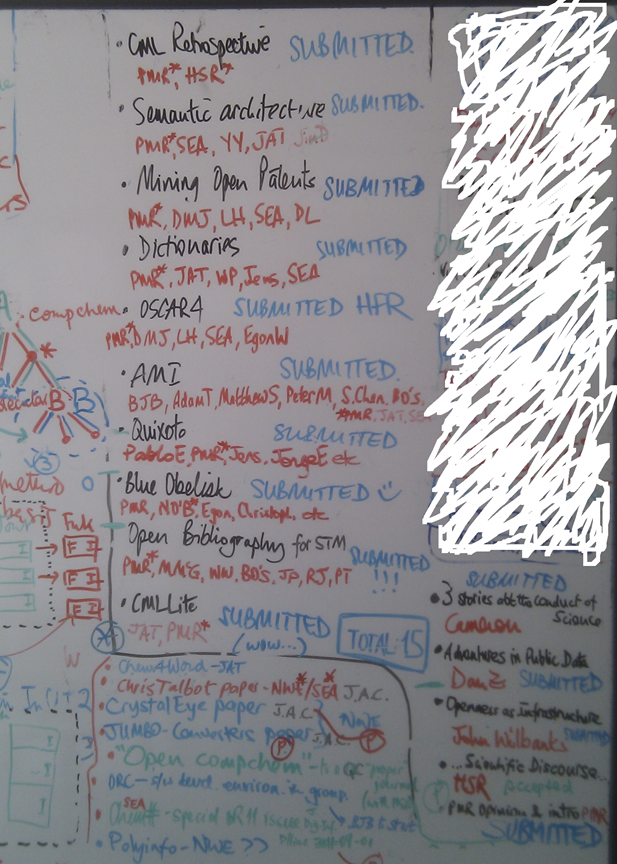As I blogged, we’ve just submitted 15 papers to the Journal of Cheminformatics – and we got them off last Tuesday. Here’s the evidence

The ones at the bottom right are the invited talks – Cameron Neylon, Henry Rzepa, Dan Zaharevitz and John Wilbanks. (The ones at centre bottom are to-be-written elsewhere/elsewhen).
We (or rather Charlotte) have been putting them into a collection in our DSpace (http://www.dspace.cam.ac.uk/handle/1810/238340 ). For the record it’s slightly less than 10 minutes per paper (though it would be more when you are fresh to the system), BUT:
- We also plan to add the raw text (*.doc, *.html or *.tex)
- And material from the VSMF event
- And a linking splash page explain everything
Why are we doing this?
- It’s a record of the work
- YOU can read the manuscripts, even if they aren’t accepted (this is not a shoe-in – they are peer-reviewed – we’ve not had reports back yet)
- You can make comments.
- You can re-use them (the material is CC-BY though it is difficult to show this in DSpace which is covered with the ritual “by default you can’t do anything”)
- It gives our work extra prominence. Our informal study of theses in the group (N=3) is that they get extra-special Google-karma. (Haven’t checked Bing!)
- It gives the Department and University extra karma, if they want it
- It gives advertisement for the Journal (on whose editorial board I sit – no it’s not a shoe-in)
- It gives something to show our funders before formal publication (yes, we’ve been working). And if we’ve missed you from acknowledgements let us know
- It gives us a warm-fuzzy altruistic feel.
I’ll be posting about these articles in the coming days. But if you want to know what makes me and my colleagues tick here’s “Semantic science and its communication – a personal view” http://www.dspace.cam.ac.uk/handle/1810/238391
What will you do if people start sending in out-of-band review reports on those papers, before they get accepted into the thematic series?
(BTW, the CAPTCHA is going insane… after clicking 10 of them I good not read, I ended up with “isitBo chemistry,” … are you handcrafting these CAPTCHAs??)
This is no different from arXiv – papers are posted before review. It’s just that we don’t have a mechanism in chemistry
I have no idea where the Captcha comes from. Sorry it’s a mess. I might ask our computer people.
Sorry, I seem to not have been clear 🙂 I do like the idea! I was just wondering if you are going to apply changes suggested by people who read the DSpace version and commented on that, as well as answering the JChemInf reviewers’ comments 🙂
I think the CAPTCHA is working as expected; it’s just that they were inhumanly difficult 🙂
If the changes suggested are compelling we would make them, of course.
So, following the arXiv example, where should we put our reviews online? Our blogs?
DSpace is not arXiv. It’s designed for archival rather than as an interactive system. It’s the best that I can do at present. Chemists have made it clear that they don’t want Open publication, they don’t want Open theses, they don’t want pre-publication peer-review and comment. DSpace is so broken that we cannot now upload moder files – you have to decide initially what you are going to upload. If you have comments, I suggest we use blogs, Blue Obelisk Shapado, FriendFeed, The New York Times – anywhere except DSpace. The papers are CC-BY though that is difficult to state so you can copy them and put them elsewhere … with attribution.
Great to see all those going out, I will be digging through the articles and think that it is great to be able to publish articles so openly. When I moved form physics to chemistry I was quite surprised by the differences – great to see them being reduced a little.